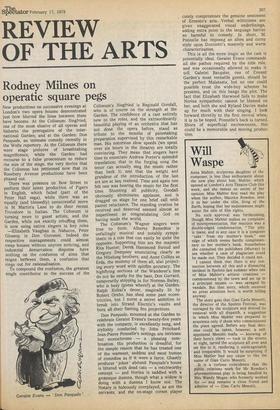Rodney Manes on operatic square pegs
New productions on successive evenings at London's two opera houses demonstrated just how blurred the lines between them have become. At the Coliseum: Siegfried, one of the most elusive of all operas and hitherto the prerogative of the international Garden; and at the Garden: Don Pasquale, an intimate comedy recently in the Wells repertory. At the Coliseum there were stage pictures of breathtaking magnificence, while the Garden had recourse to a false proscenium to reduce the size of the stage, the very device that the Coliseum has jettisoned now that its Rosebery Avenue productions have been phased out.
There was pressure on Bow Street to perform their latest production of Figaro in English, which failed (part of the Peter Hall saga), while there was an equally (and blessedly) unsuccessful move in St Martins Lane to do their recent Trovatore in Italian. The Coliseum is turning more to guest artists, and the Garden, while not exactly rebuffing them, is now using native singers in key roles —Elizabeth Vaughan in Nabucco, Peter Glossop in Don Giovanni. Indeed the respective managements could almost swap houses without anyone noticing, and industrial demarcation disputes have nothing on the confusion of aims that reigns betWeen them, a confusion that sings out for rationalisation.
To compound the confusion, the greatest single contributor to the success of the Coliseum's Siegfried is Reginald Goodall, who is of course on the strength at the Garden. The confidence of a cast entirely new to the roles, and the extraordinarily beautiful playing of an orchestra that has not done the opera before, stand as tribute to the months of painstaking preparation supervised by this remarkable man. His notorious slow speeds (we spent over six hours in •the theatre) are totally convincing. They mean that singers have time to enunciate Andrew Porter's splendid translation; that in the forging song the tenor can actually sing the music rather than bark it; and that the weight and grandeur of the introduction of the last act are at last realised. Time and again one felt one was hearing the music for the first time. Shunning all publicity, Goodall obviously abominates applause, and is dragged on stage for one brief call with patent reluctance. The standing ovation he received and deserved seemed almost as impertinent as congratulating God on having made the world.
The Coliseum's Wagner singers were true to form. Alberto Remedios is unfailingly musical and notably sympa thetic in a role that can easily be quite the opposite. Supporting him are the majestic Rita Hunter; Derek Hammond Stroud and Gregory Dempsey enunciating clearly as the Nibelung brothers; and Anne Collins as Erda, the mummy of them all, also project ing every word with spitfire accuracy. The highflying sections of the Wanderer's line do not lie easily for the bass, Don Garrard, • temporarily stepping in for Norman Bailey, who is busy (guess where?) at the Garden.
Ralph Koltai's decor, magically lit by Robert Ornbo, has shed some past eccentricities, but I nurse a secret ambition to break into Strand Electric's vaults and burn all their flaming fire projections.
Don Pasquale, mounted at the Garden to celebrate Geraint Evans's twenty-five years with the company, is excellently sung, and stylishly conducted by John Pritchard. Jean-Pierre Ponnelle's settings are intricate but monochrome — a pleasing combination. His production is dreadful, for the simple reason that he has treated one of the warmest, saddest and most human of comedies as if it were a farce. Ghastly producer ' jokes ' abOund: Pasquale's house is littered with dead cats — a retchworthy concept — and Norina •is saddled with a grotesque duenna, though what a widow is doing with a duenna I know not. The Notary is hideously overplayed, as are the servants, and the on-stage cornet player cutely compromises the genuine sentiment of Ernesto's aria. Verbal witticisms are given exaggerated visual und,erlinings, adding extra point to the language barrier so harmful to comedy. In short, M. Ponnelle has imposed an alien and corny style upon Donizetti's masterly and warm characterisation.
This is all the more tragic as the cast is potentially ideal. Geraint Evans commands all the pathos required by the title role, and was occasionally allowed to make it tell. Gabriel Bacquier, one of Covent Garden's most versatile guests, should be the perfect Malatesta, but no one could possible trust the wide-boy schemer he presents, and on this hangs the plot. The fact that Elizabeth Harwood fails to make Norina sympathetic cannot be blamed on her, and, both she and Ryland Davies make up for much with their singing. I look forward thirstily to the first revival when, it is to be hoped, Ponnelle's back is turned. Shorn of superficial excrescences, this could be a memorable and moving production.
































 Previous page
Previous page